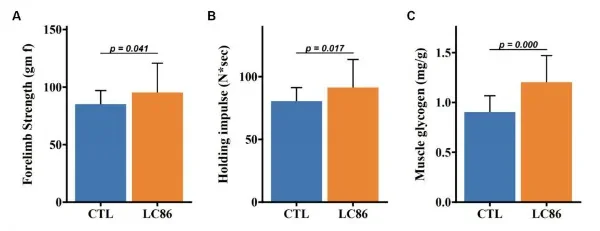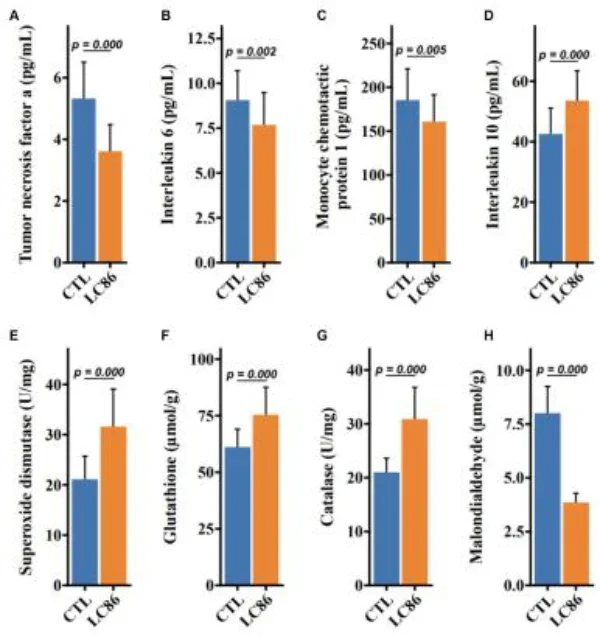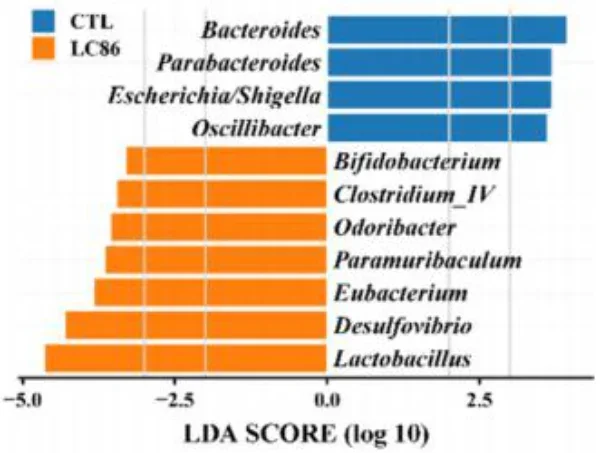Industry Insights
Home > News > Industry Insight > Lacticaseibacillus paracasei LC86 Mitigates Age-Related Muscle Wasting and Cognitive Impairment in SAMP8 Mice Through Gut Microbiota Modulation and Regulation of Serum Inflammatory Factors
Lacticaseibacillus paracasei LC86 Mitigates Age-Related Muscle Wasting and Cognitive Impairment in SAMP8 Mice Through Gut Microbiota Modulation and Regulation of Serum Inflammatory Factors

Abstract:
This study explores the effects of Lacticaseibacillus paracasei LC86 on age-related declines in muscle strength and cognitive function in SAMP8 mice. Chronic inflammation and gut microbiota composition are key factors in these declines. The administration of LC86 over 12 weeks significantly improved muscle strength, cognitive performance, and modulated gut microbiota and inflammatory markers. These findings suggest that LC86 may offer therapeutic potential for age-related muscular and cognitive impairments.
Introduction:
The global demographic shift towards an older population has increased the prevalence of aging-related conditions such as sarcopenia and cognitive decline. These conditions diminish quality of life and increase the risk of falls and fractures. Chronic inflammation and gut microbiota dysbiosis are significant contributors to these declines.
Probiotics have shown promise in enhancing gut microbiota and reducing inflammation, potentially offering therapeutic benefits against aging-related muscle and cognitive impairments. This study investigates the effects of Lacticaseibacillus paracasei LC86 on these age-related conditions in SAMP8 mice.
Methods:
· Strain Culture and Preparation: LC86 was cultured in MRS broth, harvested, and resuspended in sterile water to a concentration of 5 × 109 CFU/mL.
· Grouping and Intervention: Twenty 16-week-old male SAMP8 mice were divided into control and LC86 groups, receiving 0.2 mL of sterile water or LC86 suspension daily for 12 weeks.
· Assessment of Muscle Strength: Forelimb grip strength and four-limb hanging tests were used to evaluate muscle strength.
· Cognitive Function Tests: Open field and Morris water maze tests assessed cognitive performance.
· Analysis of Gut Microbiota: Fecal samples were analyzed to determine changes in gut microbiota composition.
· Measurement of Inflammatory Markers: Serum levels of IL-6, TNF-α, MCP-1, and IL-10 were measured.
Results:
· Muscle Strength: LC86 administration significantly increased grip strength and muscle glycogen content in the gastrocnemius muscle.

· Cognitive Function: Behavioral tests indicated that LC86 mitigated age-related cognitive decline.

· Inflammatory Markers: There was a significant decrease in pro-inflammatory cytokines (IL-6, TNF-α, MCP-1) and an increase in anti-inflammatory IL-10.

· Gut Microbiota: LC86 supplementation led to increased populations of beneficial bacteria (Bifidobacterium and Lactobacillus) and decreased levels of pathogenic bacteria (Escherichia/Shigella and Bacteroides).

Discussion:
The study demonstrates that LC86 significantly improves muscle strength and cognitive function in aging SAMP8 mice. The modulation of gut microbiota and reduction in inflammatory markers are key mechanisms underlying these benefits. These results suggest that LC86 could be a promising probiotic for mitigating age-related muscle and cognitive impairments.
Conclusion:
Lacticaseibacillus paracasei LC86 shows potential as a therapeutic agent for age-related declines in muscle strength and cognitive function. By modulating gut microbiota and inflammatory factors, LC86 may help ameliorate these age-related conditions.
Keywords:
Muscle Wasting, Cognitive Impairment, Lacticaseibacillus paracasei LC86, Gut Microbiota, Inflammatory Factors Regulation







